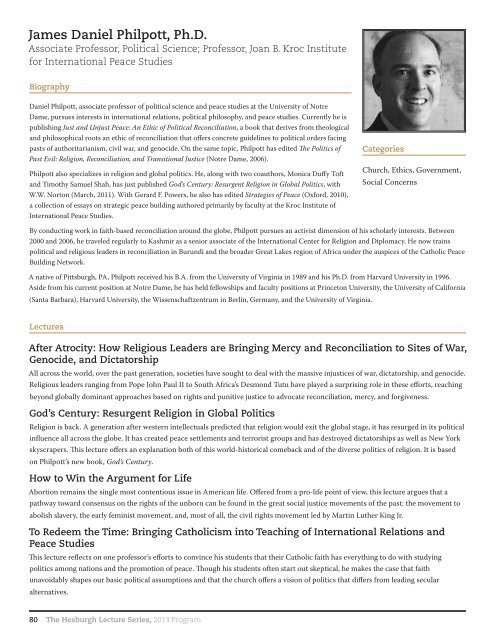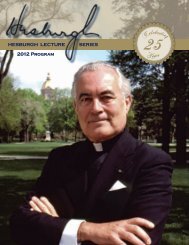HESBURGH LECTURE SERIES 2013 Program - Alumni Association ...
HESBURGH LECTURE SERIES 2013 Program - Alumni Association ...
HESBURGH LECTURE SERIES 2013 Program - Alumni Association ...
You also want an ePaper? Increase the reach of your titles
YUMPU automatically turns print PDFs into web optimized ePapers that Google loves.
James Daniel Philpott, Ph.D.<br />
Associate Professor, Political Science; Professor, Joan B. Kroc Institute<br />
for International Peace Studies<br />
Biography<br />
Daniel Philpott, associate professor of political science and peace studies at the University of Notre<br />
Dame, pursues interests in international relations, political philosophy, and peace studies. Currently he is<br />
publishing Just and Unjust Peace: An Ethic of Political Reconciliation, a book that derives from theological<br />
and philosophical roots an ethic of reconciliation that offers concrete guidelines to political orders facing<br />
pasts of authoritarianism, civil war, and genocide. On the same topic, Philpott has edited The Politics of<br />
Past Evil: Religion, Reconciliation, and Transitional Justice (Notre Dame, 2006).<br />
Philpott also specializes in religion and global politics. He, along with two coauthors, Monica Duffy Toft<br />
and Timothy Samuel Shah, has just published God’s Century: Resurgent Religion in Global Politics, with<br />
W.W. Norton (March, 2011). With Gerard F. Powers, he also has edited Strategies of Peace (Oxford, 2010),<br />
a collection of essays on strategic peace building authored primarily by faculty at the Kroc Institute of<br />
International Peace Studies.<br />
By conducting work in faith-based reconciliation around the globe, Philpott pursues an activist dimension of his scholarly interests. Between<br />
2000 and 2006, he traveled regularly to Kashmir as a senior associate of the International Center for Religion and Diplomacy. He now trains<br />
political and religious leaders in reconciliation in Burundi and the broader Great Lakes region of Africa under the auspices of the Catholic Peace<br />
Building Network.<br />
A native of Pittsburgh, PA, Philpott received his B.A. from the University of Virginia in 1989 and his Ph.D. from Harvard University in 1996.<br />
Aside from his current position at Notre Dame, he has held fellowships and faculty positions at Princeton University, the University of California<br />
(Santa Barbara), Harvard University, the Wissenschaftzentrum in Berlin, Germany, and the University of Virginia.<br />
Lectures<br />
After Atrocity: How Religious Leaders are Bringing Mercy and Reconciliation to Sites of War,<br />
Genocide, and Dictatorship<br />
All across the world, over the past generation, societies have sought to deal with the massive injustices of war, dictatorship, and genocide.<br />
Religious leaders ranging from Pope John Paul II to South Africa’s Desmond Tutu have played a surprising role in these efforts, reaching<br />
beyond globally dominant approaches based on rights and punitive justice to advocate reconciliation, mercy, and forgiveness.<br />
God’s Century: Resurgent Religion in Global Politics<br />
Religion is back. A generation after western intellectuals predicted that religion would exit the global stage, it has resurged in its political<br />
influence all across the globe. It has created peace settlements and terrorist groups and has destroyed dictatorships as well as New York<br />
skyscrapers. This lecture offers an explanation both of this world-historical comeback and of the diverse politics of religion. It is based<br />
on Philpott’s new book, God’s Century.<br />
How to Win the Argument for Life<br />
Abortion remains the single most contentious issue in American life. Offered from a pro-life point of view, this lecture argues that a<br />
pathway toward consensus on the rights of the unborn can be found in the great social justice movements of the past: the movement to<br />
abolish slavery, the early feminist movement, and, most of all, the civil rights movement led by Martin Luther King Jr.<br />
To Redeem the Time: Bringing Catholicism into Teaching of International Relations and<br />
Peace Studies<br />
This lecture reflects on one professor’s efforts to convince his students that their Catholic faith has everything to do with studying<br />
politics among nations and the promotion of peace. Though his students often start out skeptical, he makes the case that faith<br />
unavoidably shapes our basic political assumptions and that the church offers a vision of politics that differs from leading secular<br />
alternatives.<br />
80 The Hesburgh Lecture Series, <strong>2013</strong> <strong>Program</strong><br />
Categories<br />
Church, Ethics, Government,<br />
Social Concerns



